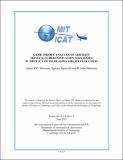| dc.contributor.author | Morrison, James | |
| dc.contributor.author | Sgouridis, Sgouris | |
| dc.contributor.author | Hansman, R. John | |
| dc.date.accessioned | 2011-05-20T14:38:08Z | |
| dc.date.available | 2011-05-20T14:38:08Z | |
| dc.date.issued | 2011-05-20 | |
| dc.identifier.uri | http://hdl.handle.net/1721.1/62856 | |
| dc.description.abstract | The air transportation system is a vital infrastructure that enables economic
growth and provides significant social benefits. Future increases and volatility in crude
oil prices, as well as environmental charges, are likely to increase the effective cost of
fuel. We investigate the impacts of effective fuel cost increase on the US air transportation system historically and perform a game theory analysis of the impact of
manufacturer competition on the introduction of new, more fuel efficient aircraft.
The cost of jet fuel increased 244% between July 2004 and July 2008, providing a natural experiment to evaluate how fuel price increase affected continental US networks and fleets. It was found that non-hub airports serving small communities lost 12% of
connections, compared to a system-wide average loss of 2.8%. Increased effective fuel costs will provide incentives for airlines to improve fleet fuel efficiency, reducing the
environmental impacts of aviation, but may cause an uneven distribution of social and economic impacts if small communities suffer greater loss of mobility. Government
action may be required to determine acceptable levels of access as the system transitions
to higher fuel costs.
Technology innovation may act as a long-term hedge against increasing effective
fuel costs, enabling mobility to be maintained. The single aisle commercial aircraft
market segment is the largest, but has the longest running product lines. We hypothesize
that competition has important effects on manufacturers’ decisions to innovate that must
be considered when designing policies to reduce fleet emissions. An aircraft program
valuation model is developed to estimate expected payoffs to manufacturers under
competitive scenarios. A game theory analysis demonstrates how the incentives to
innovate may be altered by subsidies, technology forcing regulations, increased effective
fuel costs, the threat of new entrants, and long-term competitive strategies. Increased
competition may result in incumbent manufacturers producing re-engined aircraft while increased effective fuel costs may result in new aircraft programs. Incumbents’ optimal
strategies may be to delay the entry of new single aisle aircraft until 2020-24, unless
technology forcing regulations are implemented. | en_US |
| dc.description.sponsorship | This work was supported by the MIT/Masdar Institute of Science and Technology
under grant number Mubadala Development Co. Agreement 12/1/06. The authors wish to
thank PARTNER for access to the Piano-X software package and Robert M. Peterson
from the Boeing Corporation for his valuable feedback on the aircraft program valuation
model. Any errors are the authors’ alone. | en_US |
| dc.language.iso | en_US | en_US |
| dc.relation.ispartofseries | ICAT;2011-4 | |
| dc.rights | An error occurred on the license name. | en |
| dc.rights.uri | An error occurred getting the license - uri. | en |
| dc.subject | air transportation | en_US |
| dc.subject | infrastructure | en_US |
| dc.subject | oil prices | en_US |
| dc.subject | game theory analysis | en_US |
| dc.subject | fuel efficient aircraft | en_US |
| dc.title | Game Theory Analysis of Aircraft Manufacturer Innovation Strategies in the Face of Increasing Airline Fuel Costs | en_US |
| dc.type | Technical Report | en_US |
